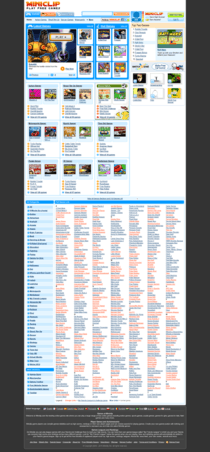Miniclip
|
| |
|
Screenshot
Screenshot of the Miniclip homepage in June 2016 | |
Type of site | Online games |
|---|---|
| Available in | English, French, Spanish, German, Portuguese, Italian, Polish, Hindi, Romanian, Hungarian, Korean, Chinese, Turkish, and Japanese |
| Founded | March 30, 2001 |
| Headquarters | Neuchâtel, Switzerland |
| Key people | Robert Small: CEO |
| Slogan(s) |
"Play Games" (Former slogans: "Play Online Games", "Play Free Online Games", "Free Games and Shows") |
| Website | www.miniclip.com |
| Alexa rank |
|
| Registration | Optional |
| Current status | Active |
Miniclip is a free online games website. It was launched in 2001 and is known for having a large and varied collection of games. It is the world's largest privately owned online gaming website.[2] It was started in 2001 by Robert Small and Tihan Presbie (who is no longer with the company) on a budget of £40,000[3] and quickly grew. As of 2008, the company has been valued at over £900 million, having been profitable for six of its first seven years, with turnovers exceeding £20 million from 2006–2008 alone.[3]
Game players

Miniclip has a social system with unregistered "game players" who play games with each other and play in custom friend leagues together.
Players have their own game player pages with their games, statistics, awards, friends and applications.
- Player Profile Pages: Game players have their own game profile pages where their games, high scores, friends and other game related information are stored.
- Awards & Achievements: Awards are earned by performing actions on the website, such as achieving high scores in games. Once awards are won they are displayed in a player's league and are displayed on a user's Profile Page.
- Leader boards: The worldwide daily, weekly and monthly leader boards are displayed in games.
- Game Ranking Bar: Players are ranked worldwide with a special color-coded, percentage-based worldwide ranking bar system that is found next to their games on their profile page.
- Games News Feed: Players have a games news feed on their profile pages which gives them information on the winning or losing of challenges, friend invites, announcements etc.
- Matchmaking: For certain new live multiplayer games there is a real time matchmaking system to match up players to other players of similar ability or for players to choose the ability of others to play against or for players to play against their friends in real time.
- Game Avatars: Avatars are called YoMe's and can be customized to include many different looks and styles. The avatars can be changed to have their own looks. The avatars enter certain games and carry game player statistics and awards.
Game developer API's
Miniclip offers game developers a number of API services that allow them to integrate Miniclip branded features into their games, for example these allow third party developers to create games that can contribute high scores to a user's high score ranking on the Players service.
Wii
In 2009, Miniclip made Wii-playable games on their website. It can be accessed through the Wii Internet Channel.
Miniclip Webmaster's
- Miniclip Webmasters is a website by Miniclip where you can add their games to your website for free using HTML codes that they provide.
Security issues
Several security firms reported in 2006 that some Miniclip users had installed a "miniclipgameloader.dll" which contains the hostile code identified as "Trojan DownLoader 3069".[4] Removal tools are available. Reports in 2006 from the same security vendors show the same file as not containing hostile code. In 2006, the security firm Sunbelt Software reported that Miniclip installed "High Risk" malware called "Trojan-Downloader.CR64Loader".[5] On September 1, 2005, the United States Computer Emergency Readiness Team issued an advisory concerning Miniclip:
The Retro64 / Miniclip CR64 Loader ActiveX control contains a buffer overflow vulnerability. This may allow a remote, unauthenticated attacker to execute an arbitrary code on a vulnerable system.... Although the ActiveX control is no longer in use by either retro64.com or miniclip.com, any system that has used certain pages of these web sites in the past (prior to September, 2005) may be vulnerable.[6]
Mobile games
Miniclip also has many mobile games that are available for iOS, Android, Symbian and Windows Phone, such as 8 Ball Pool, Gravity Guy, Bloons TD 5 , Plague Inc., Berry Rush, Agar.io, Diep.io and Thunderbirds Are GO!.
Xbox games for Windows 8
In September 2012, Microsoft announced on Windows team blog dated August 31, 2012 (see also List of Xbox games on Windows) that Miniclip games will be able distribute their game on the Xbox division of Windows 8. Miniclip games that are supported by Xbox for Windows 8 include Gravity Guy, iStunt 2 and Monster Island. Gravity Guy was released on Windows Store on November 29, 2012. In April 2013, most of the Miniclip games for Windows 8 and Windows Phone were distributed for free for one year.
References
- ↑ "Miniclip.com - Site Information from Alexa". Retrieved 2011-02-08.
- ↑ Weber, Rachel. "From MiniClip to Mega Brand". Game Industry Biz. Retrieved 3 November 2016.
- 1 2 "FT.com - Game Plan Keeps It Simple". Archived from the original on June 3, 2009.
- ↑ "Trojan.DownLoader.3069 / MINICLIPGAMELOADER.DLL". Prevx. July 15, 2005. Archived from the original on 2007-12-15.
- ↑ "Threat Details - Trojan-Downloader.CR64Loader". Sunbelt Software. September 14, 2006. Archived from the original on 2007-12-16.
- ↑ "Vulnerability Note VU#649289, Retro64 / Miniclip CR64Loader ActiveX control buffer overflow". United States Computer Emergency Readiness Team, Department of Homeland Security. 2006-09-01.
- Closure of Sketch Star Announcement on Miniclip Blog
- See old versions of http://www.Miniclip.com on
